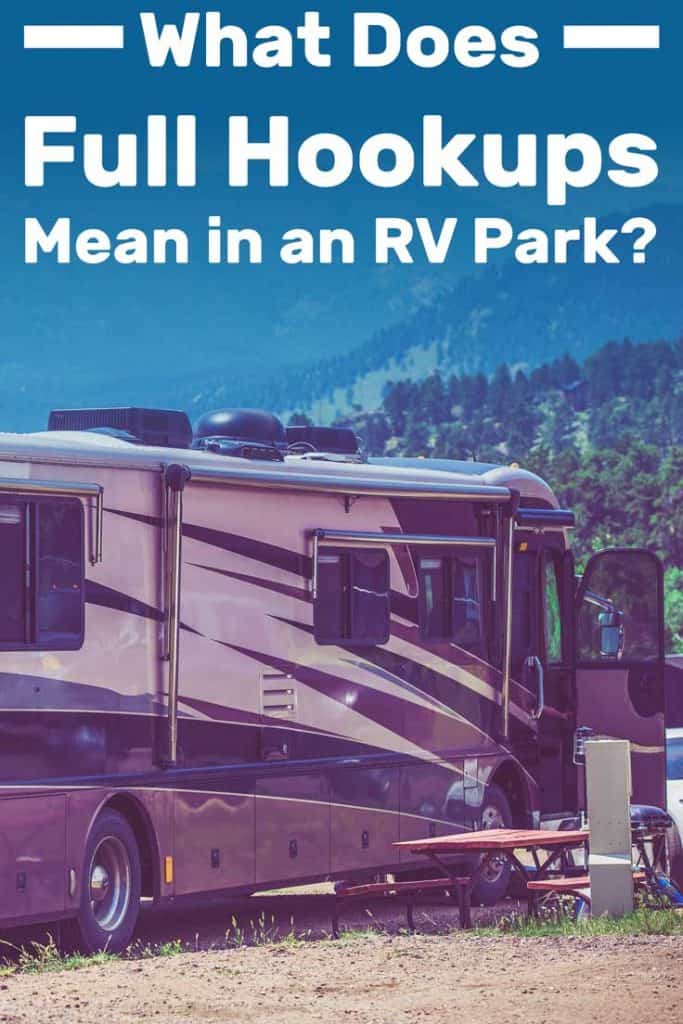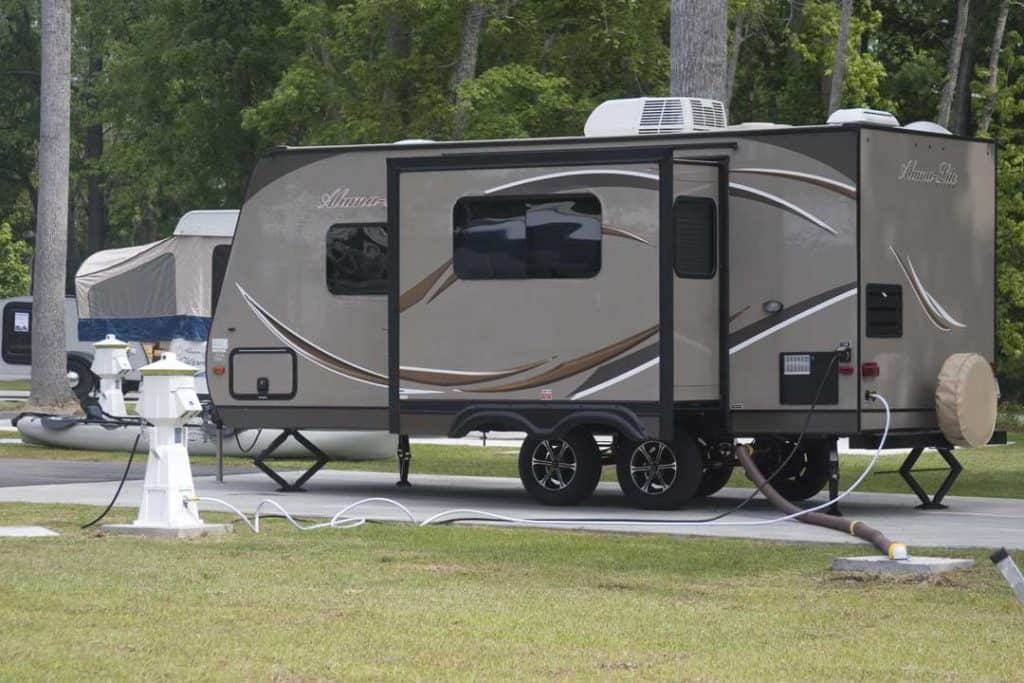If you are just getting into the RV lifestyle, you are probably wondering just what "full hookups" means. It is a common phrase to see listed in campground information, but are they really necessary or just a frivolous luxury? Well, to help you decide, I decided to create a full write-up covering this topic in depth. Follow along to find out if full hookups are for you.
 In the RV world, "Full hookups" simply means that your RV site will have fresh water, electricity, and a sewer. By connecting your RV to all of these services, you can treat your RV as your home: no water rationing, worrying about running a generator or finding a dump-out site on your way home. Full hookups are a great option for anyone who wants to retain as many of the amenities of home while camping.
In the RV world, "Full hookups" simply means that your RV site will have fresh water, electricity, and a sewer. By connecting your RV to all of these services, you can treat your RV as your home: no water rationing, worrying about running a generator or finding a dump-out site on your way home. Full hookups are a great option for anyone who wants to retain as many of the amenities of home while camping.
So, clearly, full hookups are a great luxury for any RV owner to have. But is it really necessary and are there any downsides to using full hookups? Keep reading to find out!
What are Full Hookups?
As we mentioned earlier, whenever an RV park says it has full hookups, you can expect to have access to fresh water, electricity, and sewage for your RV. Just as your home is hooked up to all of your utilities, a full hookup site will give you access to the unlimited use of everything in your RV.
Water
Most RVs have a water tank ranging from 20 to 100 gallons, meaning you will have at least a few days worth of water on board. Having that limited supply can cause anxiety, however. After all, you don't want to run dry right before you rinse the shampoo out of your hair. RV sites with full hookups will have a fresh water supply that connects right to your RV. This allows you the luxury of long showers and dishwashing without having to worry about using up your entire water supply.
Electricity
Whether your RV requires 30 or 50-amp power outlets, most full hookup RV sites will have you covered. Simply plug your RV into the supplied power outlet, and you are ready to enjoy everything your RV has to offer without stressing about how full your batteries are.
As an added bonus, if your RV neighbors all have hookups as well, you won't have to listen to anyone's noisy generator while you are camping. Note that some RV parks will only supply 30-amp outlets, so if you require 50 amps to run your RV amenities, it's best to check before you leave.
No hook ups? Still need power? Here's how to choose the best RV generator for your needs.
Sewer Connection

The final element of a full hookup RV spot is a sewer connection. When you arrive, you will be able to connect your sewer hose to the provided sewer line. This means you can use your toilet as much as you want, and it will drain immediately into the RV campground sewer. When you're done, you can simply rinse out the hose and pack it up - no dumping out required!
Additional services
While "full hookups" always includes the aforementioned services, occasionally some larger parks will throw in some extras as well. This includes cable television, which may or may not involve paying an extra fee.
Partial Hookups
If you have ever seen a campground offering full hookups, then I'm sure you are also familiar with the term "partial hookups." Naturally, these sites offer some, but not all, of the utility connections that the full hookup sites do.
The accepted definition of a partial hookup site is one that offers electricity and water, but no sewage service. This leaves you with the choice of either using public restrooms or pumping your RV out after your camping trip. While it's not as convenient as full hookups, partial hookups are still very nice to have. Partial hookups normally cost significantly less than full hookups, making them a very popular option at most RV campgrounds.
Boondocking
Boondocking, or dry camping, or free camping, is simply camping without any type of hookup at all. When you are boondocking, you are truly on your own. That means you will need to bring all the water you need for your whole trip. You also need to be cognizant of the state of your battery - boondockers often bring solar panels or generators to keep their batteries above the 50% mark in order to prevent degradation.
Often when you boondock, you can simply pull off the road and make a campsite - no RV campground involved. It is important that you do this only in approved locations, however. Often, BLM land is approved for such use, but you will need to research the rules and regulations beforehand to ensure you are doing it properly.
Read more: 17 Boondocking Tips That Actually Make A Difference
Why not Always Have Full Hookups?
If full hookups allow you to live out of your RV carefree, then why would anyone ever NOT have them? Well, there are plenty of good reasons people have for eschewing sites with full hookups. Interestingly, it seems that most RVers come down solidly on one side or the other of the hookups question.
No matter what your feelings, the main thing is that you get out there and enjoy your RV. So, why are some RV owners choosing partial hookups or boondocking over full hookups?
Cost
First and foremost, full hookups come with a price tag. If you plan on using full hookup sites often, you can check out the Passport America membership, which includes 50% off at nearly 1800 campgrounds for just one small yearly fee. Keep in mind that if you decide to use your black tank instead of paying for sewer hookups, you will often later have to pay to dump out, which will offset the savings you had planned on enjoying.
Tranquility
Some RV owners prefer the peace and isolation of boondocking to the hubbub of a bustling campground. For this reason, plenty of RV owners may never even use a site with full hookups. While I have certainly used full hookup sites in the past, I find that I actually prefer to boondock most of the time for this reason.
Need
Even if the cost and close confines of sites with full hookups don't turn you away, you might just find that all of the amenities they offer are not necessary for you. Perhaps you only use your RV for one or two nights at a time. Or maybe you don't have or use many of the normal RV utilities that are served by these hookups. Whatever the reason, some RV owners find that they just can't justify using a site with hookups for their purposes.
Location and Access
One other aspect of the full hookup life to consider is the location of these sites. While it is usually fairly easy to find RV sites with these hookups, they will not always be in the right location for your planned trip. Or, even more commonly, all of the available sites at your preferred campsite may be all booked up before you decide to stay there. Popular sites will often be booked up several months out during the high season. For this reason, you might have to choose a different type of site, even if you find full hookups very appealing.
What is the Average Price for RV Campsites?
We know that full hookup sites cost more than partial hookups and, of course, boondocking, but just how much money are we talking? On average, you can expect to pay around $45 on average for a full hookup site with all the fixings, although they can range from as low as $20 all the way up to $80, according to this article from camper report.
Of course, the more popular the location and the time of year, the more you can expect to pay. If you are lucky, you can occasionally find great deals for less than $40 per night, although you probably won't find yourself in the best campground at that price.
Now, partial hookups are almost always cheaper than full hookups, but you can't always predict by how much. Sometimes, you can find partial hookup sites for half the price of full hookups, and sometimes they will only come with a small discount.
Savvy RV owners can often find good deals if they know where to look. For example, RV sites at state and national parks tend to offer hookups at a much lower price than at private RV parks. These sites, especially those at national parks, tend to book up quickly, however, so make sure to book your sites well in advance.
Now, Get out there and Pick Your Sites!
Okay, now we have discussed just what all is included in a full-hookup RV site as well as how much you can expect to pay. This is the point where you decide what route you want to take on your next trip. If you find it hard to decide, I recommend trying out all of your options, then decide what works best for you.
Chances are, you will find that one option appeals to you more than the other. Perhaps you are one of the minority of RV owners who will use a mix of hookup sites and boondocking. Who knows? No matter what, make sure you get out there and live your best RV life!

Very interesting Thanks